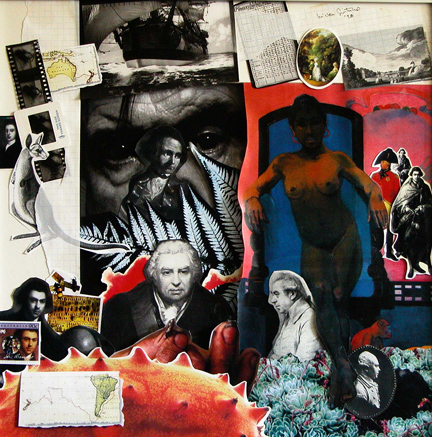 |
JOSEPH BANKS:
and the “Seven Gentlemen”
JOSEPH BANKS: 1743-1820,
British naturalist.
Note: "Gentlemen" was Captain Cook's name for those protégées of Banks, on the voyage, who were neither servants nor crew.
Sir Joseph Banks never visited the Polar regions. Technically he does not belong in this collection or in any exhibition about the Poles. However, his style and methodology strongly influenced all the expeditions that followed his time.
Born in London into a wealthy family, Joseph Banks received his earliest education at home under private tutelage. Later, his passion for botany and dedication to Linnean precepts had developed to such an extent that, unable to study botany at Oxford, Banks imported a private tutor from Cambridge. Following the death of his father in 1761, he became an independently wealthy man.
At 25 years old, and one of the wealthiest fellows of the Royal Society, he successfully lobbied to be included on what was to be Captain James Cook's first great voyage of discovery, on board the Endeavor (1768-1771). The Endeavor sailed into Botany Bay in April 1770 and proceeded up the coast and through Torres Strait, charting the east coast of Australia for the first time. One of Banks’ protégées was a young artist named Sidney Parkinson. Parkinson’s art introduced the world to many species of plants and animals, including the kangaroo. Banks learned about tattooing from the people of the south pacific. He was tattooed himself, (we don’t know where), and introduced it to European society and the sailors of Endeavor.
Banks planned to sail on Cook's next voyage to Antarctica, and had the Resolution fitted out for himself and an entourage of 15. However, the ship became top-heavy and Cook ordered the fittings removed. Banks resigned in a rage. Frustrated in his attempt at a second voyage to the South Seas and partially out of sense of obligation to the entourage, Banks and company set off in July 1772 for Iceland, his only other venture outside Europe.
From that time, Banks was actively involved in almost every aspect of Pacific exploration and early Australian colonial life. King George III appointed him adviser to the Royal Botanic Gardens at Kew some time after his return from the Pacific
Banks established his London home as a scientific base. His natural history collections were housed there and made freely available to explorers, scientists and researchers. Until his death, his house was a center for the wider scientific community. He did not discriminate between British and foreign scientists. Bellingshausen traveled from Russia to England to consult with Banks.